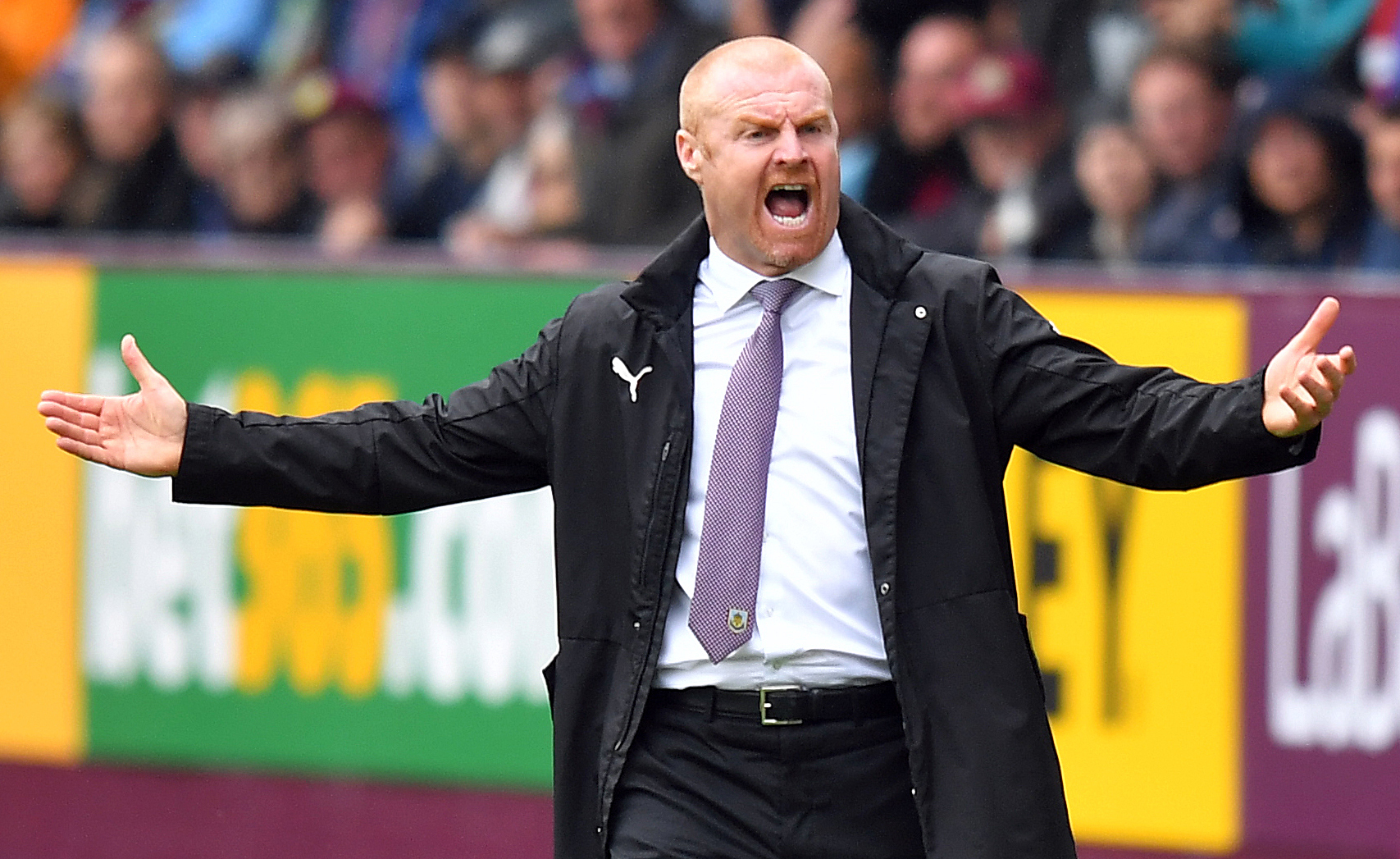Two games into a new season is not the time to make grand pronouncements. Weird stuff happens in two games. From a performance perspective, very little is done that cannot be undone. Although the same doesn’t quite hold true when it comes to results (the fact that Arsenal already trail Chelsea by six points looms large for example), it's important to separate out the unfortunate dropped points, from the warnings of bad underlying performances. It’s useful to put the unexpected in context. Often, a look back at last season, or even further, makes seemingly unlikely events seem more common place.
Burnley’s Defensive Struggles
Last year’s seventh place team has one point from their first two games. They’ve also already conceded three goals. The concerning thing is that those two matches have been against Southampton and Watford. A dull scoreless draw on the road to open the season isn’t unreasonable, but to then come home and concede three to Watford in their home opener is at least a little alarming for Sean Dyche's team. Last season, Burnley didn’t concede three goals to a team outside the top six a single time, and the only time they conceded twice was in a home loss against Bournemouth. Watford scored early, but Burnley almost immediately equalized, so the two teams were on equal footing for most of the first half, and entering the second. Watford took the lead with the kind of goal, a defense splitting move from Troy Deeney, that Burnley are supposed to be very resistant to. If Burley’s defense can’t prevent these kinds of looks, they’re not going to come close to achieving last year’s results. 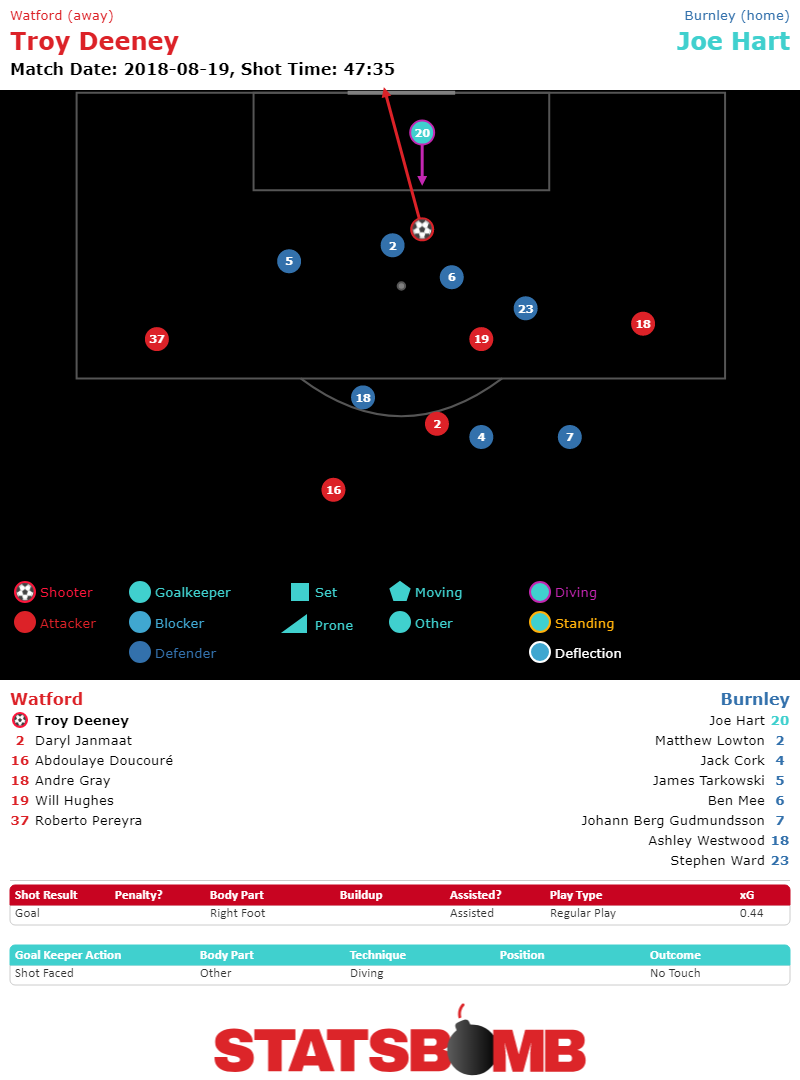 Maybe Burnley’s defense simply had an off day, it happens. But it’s worth considering that the three goals they’ve conceded are in line with the 2.9 expected goals, the model predicts. The questions around Burnley have often surrounded their mysterious ability to concede fewer goals than expected goals might predict. That's not what's happened so far this season. Instead, Dyche's team's xG has gotten worse, moving from 1.27 per game to 1.45. That would be a surprising result were it to persist. Most likely this is just a rough start, and the team's defensive xG will move back towards where we expect it to be, but even then don't be surprised if Burnley concede more goals this season than last.
Maybe Burnley’s defense simply had an off day, it happens. But it’s worth considering that the three goals they’ve conceded are in line with the 2.9 expected goals, the model predicts. The questions around Burnley have often surrounded their mysterious ability to concede fewer goals than expected goals might predict. That's not what's happened so far this season. Instead, Dyche's team's xG has gotten worse, moving from 1.27 per game to 1.45. That would be a surprising result were it to persist. Most likely this is just a rough start, and the team's defensive xG will move back towards where we expect it to be, but even then don't be surprised if Burnley concede more goals this season than last.
Manchester United’s No Good Very Bad Day
After losing to Brighton 3-2, Jose Mourinho made the point that his team was punished for every mistake that they made. And he wasn’t really wrong. Brighton scored from their second and fifth shots, their first two on target. Brighton’s first two goals came from a collection of shots that were worth a total of 0.74 expected goals. On lots of days they’ll only score once from those shots, and on some days they won't score at all. On the face of it, United were unlucky to concede the way they did. That said, they also created next to nothing. After they went behind, United created a grand total of seven shots before Paul Pogba’s very late penalty. Three of those came from corner routines. For a team with as much dynamic talent as United have, chasing the game against worse opponents, it was an anemic attacking performance. 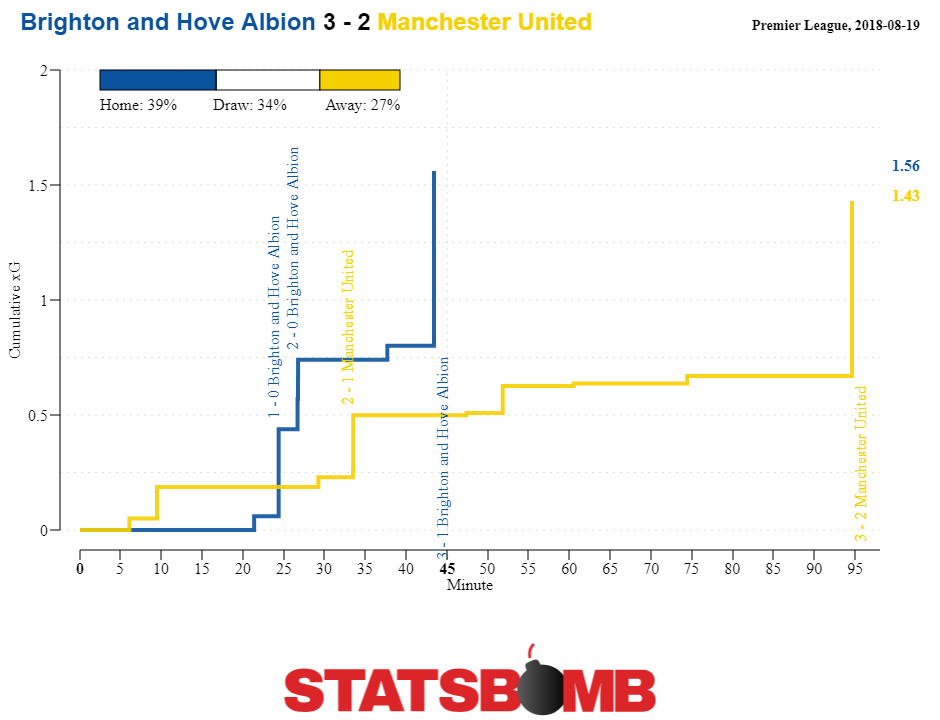 So, yes, Mourinho was right to say his team was harshly punished for their mistakes. But, that only diagnosis part of the problem. United have spent the better part of the last season and change only being able to get results if circumstances are favorable. They’ve gotten away with it because David De Gea has been so good in goal, that United simply haven’t dealt with very many situations where they’ve been harshly punished. But, that’s not generally how the world works. The best teams need to be able to win even when they get an ugly path. They need to be able to generate attacking impetus to chase down the game after getting a bad break, and to score anyway. United's performance against Brighton showed no signs of being able to do that, late penalty not withstanding. United spent a year being bailed out by De Gea, but even the best keeper in the world isn’t going to be unbeatable every week of the season year after year. United avoided those inevitable human days last season. This is what they look like when they don’t.
So, yes, Mourinho was right to say his team was harshly punished for their mistakes. But, that only diagnosis part of the problem. United have spent the better part of the last season and change only being able to get results if circumstances are favorable. They’ve gotten away with it because David De Gea has been so good in goal, that United simply haven’t dealt with very many situations where they’ve been harshly punished. But, that’s not generally how the world works. The best teams need to be able to win even when they get an ugly path. They need to be able to generate attacking impetus to chase down the game after getting a bad break, and to score anyway. United's performance against Brighton showed no signs of being able to do that, late penalty not withstanding. United spent a year being bailed out by De Gea, but even the best keeper in the world isn’t going to be unbeatable every week of the season year after year. United avoided those inevitable human days last season. This is what they look like when they don’t.
Scorers Score
A number of teams across the Premier League feature players who have a reputation as lacking end product. Alvaro Morata is Chelsea’s starter. He scored only 11 goals last season, though he had 13 expected goals, and his limited minutes, meant his xG per 90 of 0.53 was quite respectable. Still the question remains as to whether his poor second half with Chelsea last season is the most important factor when predicting his future, or his general strong goal scoring record across the years with not only Chelsea, but also Juventus and Real Madrid. Against Arsenal, he scored a very tidy goal, beating an isolated defender and sending Peter Cech the wrong way. One goal, of course, proves nothing either way. But, it’s exactly the kind that his career record suggests he should be scoring, and the second half of last season suggests should be a rarity. Then there’s Raheem Sterling. He’s been much maligned over the course of his career for what amounts to a failure to convert the occasional low xG chance into a goal. Then, to start this season off, he did this. 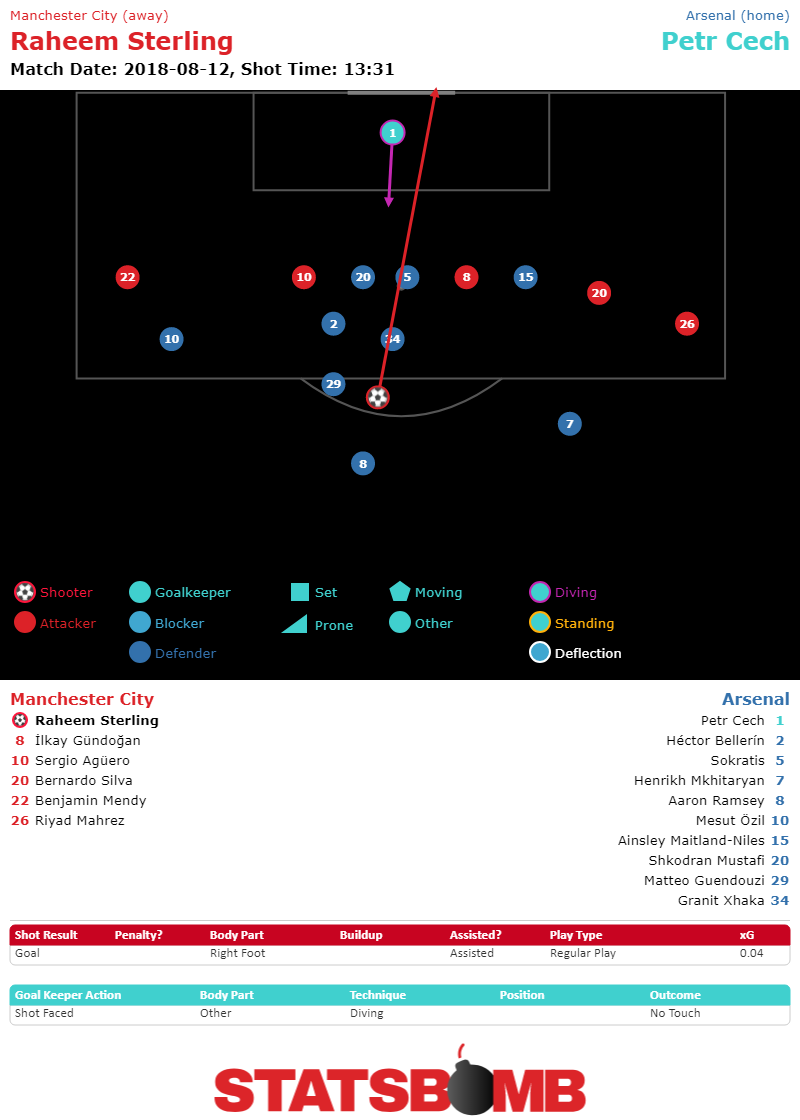 Unlike with Morata, it’s fair to say that based on the bulk of his history, that specific kind of goal is an unlikely one for Sterling. On the one hand, Sterling is a terrific goal scorer, on the other, the goal he scored in City’s opener against Arsenal is genuinely one he hasn’t shown a proficiency for over the course of his career. If he begins to add the occasional bomb from the edge of the penalty area to his game then look out. It’s useful to keep that dichotomy in mind as the season progresses. Expect Sterling to score goals, but don’t expect too many like that one. And finally there’s Richarlison. The price tag of his move to Everton raised eyebrows this summer. He was after all, a player with only five Premier League goals to his name moving for £40 million. The knock against him was his lack of end product, a reasonable reaction to the fact that those five goals were significantly below the double digit expected return on his 102 shots. He’s now scored three in his first two games with Everton. Here again, this is only surprising is your starting assumption was that, in fact, Richarlison was in some meaningful way a bad finisher. The power of expected goals though is that it allows for a more basic, and accurate assumption, namely that Richarlison was probably not nearly as bad a finisher as his stats indicated last season, and that he’d likely be just fine in the long run. Similarly, Everton shouldn’t expect Richarlison to keep scoring multiple goals from a set of chances that only works out to 0.55 xG.
Unlike with Morata, it’s fair to say that based on the bulk of his history, that specific kind of goal is an unlikely one for Sterling. On the one hand, Sterling is a terrific goal scorer, on the other, the goal he scored in City’s opener against Arsenal is genuinely one he hasn’t shown a proficiency for over the course of his career. If he begins to add the occasional bomb from the edge of the penalty area to his game then look out. It’s useful to keep that dichotomy in mind as the season progresses. Expect Sterling to score goals, but don’t expect too many like that one. And finally there’s Richarlison. The price tag of his move to Everton raised eyebrows this summer. He was after all, a player with only five Premier League goals to his name moving for £40 million. The knock against him was his lack of end product, a reasonable reaction to the fact that those five goals were significantly below the double digit expected return on his 102 shots. He’s now scored three in his first two games with Everton. Here again, this is only surprising is your starting assumption was that, in fact, Richarlison was in some meaningful way a bad finisher. The power of expected goals though is that it allows for a more basic, and accurate assumption, namely that Richarlison was probably not nearly as bad a finisher as his stats indicated last season, and that he’d likely be just fine in the long run. Similarly, Everton shouldn’t expect Richarlison to keep scoring multiple goals from a set of chances that only works out to 0.55 xG. 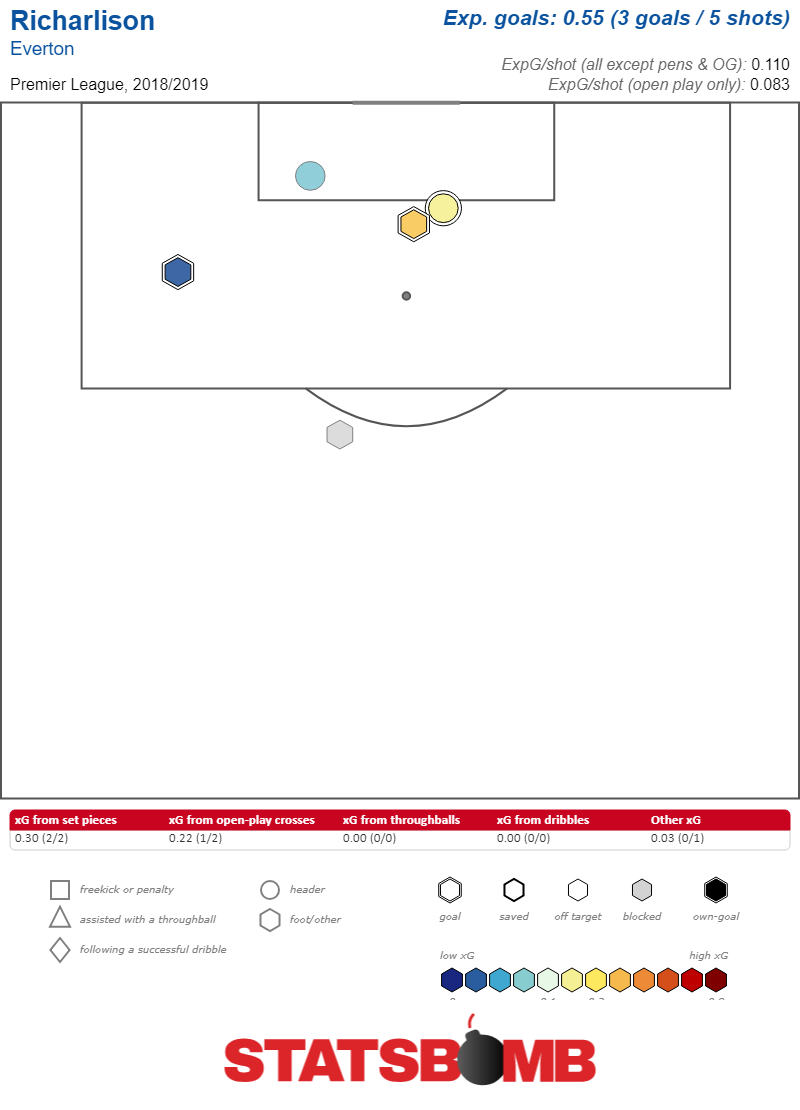 Morata’s own history provides lots of reasons to expect the kind of goal he scored against Arsenal to be a normal occurrence. Sterling’s career provides evidence that he’ll score a lot, but not necessarily in the way he opened his account this season. For Richarlison, it’s his underlying numbers that make his goal scoring run expected. One of the powers of expected goals is that it anchors expectations rather than then sending observers chasing their eyes for a reason after every hot or cold streak. So, these goals from the young Brazilian aren’t unexpected given the more robust baseline that xG provides. Similarly, don’t expect them to continue at quite this pace.
Morata’s own history provides lots of reasons to expect the kind of goal he scored against Arsenal to be a normal occurrence. Sterling’s career provides evidence that he’ll score a lot, but not necessarily in the way he opened his account this season. For Richarlison, it’s his underlying numbers that make his goal scoring run expected. One of the powers of expected goals is that it anchors expectations rather than then sending observers chasing their eyes for a reason after every hot or cold streak. So, these goals from the young Brazilian aren’t unexpected given the more robust baseline that xG provides. Similarly, don’t expect them to continue at quite this pace.
